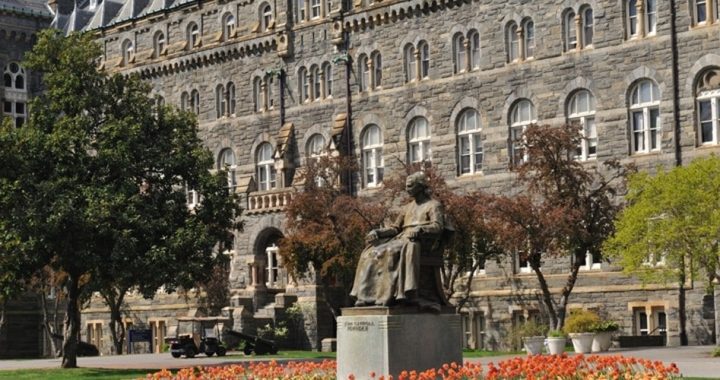
If you’re a fourth or fifth generation Irish boy at Georgetown University, whose ancestors came to America after the abolition of slavery, the school may punish you for an injustice in which neither you nor your ancestors were involved. Even worse, perhaps, you may have been beguiled into believing that you and your peers are deserving of this punishment.
Beginning in the fall 2020 semester, if Georgetown students who voted in favor of Thursday’s referendum have their way, you’ll pay a $27.20 fee into a slavery reparations fund. Your ancestors who landed at Ellis Island somewhere about 1910 played no role in slavery, but that won’t matter. You’ll pay reparations.
And if you’re grandfather seven generations removed fought for the Federal army during the War Between the States, or even if you came to the United States from Russia in 2002, that won’t matter either. You’ll pay.
But how about if you have an ancestor who did own slaves? Should you be punished for the sins of an ancestor who lived many generations before you were born?
The politically correct answer is yes. Thus do we learn that the average American kid at Georgetown may pay a price beyond the tuition that buys an ideologically contaminated education that is anti-white, anti-male, anti-Christian, and anti-American. He may be required to fork over a “fee” to pay for a putative crime he did not commit.
Fee to be Paid in Perpetuity
The proposed fee comes out of a referendum to support the so-called GU272, the official designation of descendents of 272 slaves whom the Jesuits sold in 1838 to pay the nation’s oldest Catholic university’s debts.
The “Reconciliation Contribution” would raise $400,000 annually to help members of the GU272 — blacks living today who claim a blood line back to those slaves. Of course, the intended recipients of the money were never slaves, and the students who would pay the “fee” were never slaveowners.
The vote was about 2-1, CNN reported, with 2,541 voting for the measure and 1,304 voting against it.
The language in the measure is a good gauge of the brainwashing that goes on at universities:
As students at an elite institution, we recognize the great privileges we have been given, and wish to at least partially repay our debts to those families whose involuntary sacrifices made these privileges possible. As individuals with moral imagination, we choose to do more than simply recognize the past — we resolve to change our future. And since we truly wish to “go, set the world on fire,” we choose to do so in this place, on this day, and with this ballot. And, echoing the words of the Working Group’s report, “while we acknowledge that the moral debt of slaveholding and the sale of the enslaved people can never be repaid, we are convinced that reparative justice requires a meaningful financial commitment.”
Thus did the students vote to pay the $27.20 fee beginning in the fall of 2020, which is only the beginning, the measure says, of the wallow in guilt:
The Contribution will initially be $27.20 in fall of 2020, in honor of the 272 people sold by Georgetown, and in recognition of their involuntary role in the founding and preservation of our University. In subsequent years, the Reconciliation Contribution will increase by the rate of inflation as used in the Student Activities Fee.
Neither the Washington Post nor other media ventured to ask when the descendents of the 272 will be adequately compensated, even though the fee, in its first year alone, will raise almost the entirety of the $500,000 the Jesuits earned when they sold the slaves.
The Post and other media reported that proponents of the referendum are giddy with joy, but others aren’t so happy for an obvious reason: It is meaningless and irredeemably unjust. The people who should be compensated are dead, as are those who should pay the compensation.
Students Rizana Tatlock and Henry Dai explained the problem in the school newspaper. The referendum “is a mandatory fee which, by nature, represents a moral judgement on the responsibility of Georgetown students for the institution’s past,” they wrote. The fee is an “an unjust imposition of a moral judgement on the entire student body.”
The two propose other ways to compensate those unaffected by slavery, and concluded by saying that “no matter how strongly you feel obliged to donate to the descendants of the GU272, you should vote no to prevent an unjust imposition on your peers. Anything else would be a slap in the face of liberty.”
Not All Students Voted
Aside from ignoring the obvious question of how much compensation is enough, some stories about the vote give the false impression that a majority of undergraduates voted for the fee.
That is not the case.
Only 3,845 of the school’s undergraduates voted, just 57.9 percent of the student body, AP reported. A little arithmetic shows we have yet to hear from the rest of the university’s 6,640 undergrads.
The university’s board of trustees, CNN reported, must still vote on the measure.
Photo of Georgetown University: aimintang/iStock Unreleased/Getty Images



